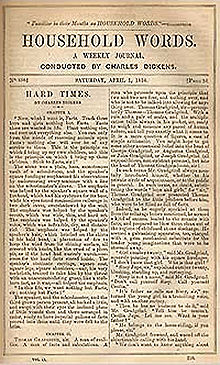Hard Times (novel)

Title page of the serial in Household Words, April 1854
|
|
| Author | Charles Dickens |
|---|---|
| Original title | Hard Times – For These Times |
| Country | England |
| Language | English |
| Genre | Novel |
| Published | Serialised April 1854 –12 August 1854; book format 1854 |
| Publisher | Bradbury & Evans |
| Media type | |
Hard Times – For These Times (commonly known as Hard Times) is the tenth novel by Charles Dickens, first published in 1854. The book surveys English society and satirises the social and economic conditions of the era.
Hard Times is unusual in several respects. It is by far the shortest of Dickens' novels, barely a quarter of the length of those written immediately before and after it. Also, unlike all but one of his other novels, Hard Times has neither a preface nor illustrations. Moreover, it is his only novel not to have scenes set in London. Instead the story is set in the fictitious Victorian industrial Coketown, a generic Northern English mill-town, in some ways similar to Manchester, though smaller. Coketown may be partially based on 19th-century Preston.
One of Dickens's reasons for writing Hard Times was that sales of his weekly periodical, Household Words, were low, and it was hoped the novel's publication in instalments would boost circulation – as indeed proved to be the case. Since publication it has received a mixed response from critics. Critics such as George Bernard Shaw and Thomas Macaulay have mainly focused on Dickens's treatment of trade unions and his post–Industrial Revolution pessimism regarding the divide between capitalist mill owners and undervalued workers during the Victorian era. F. R. Leavis, a great admirer of the book, included it — but not Dickens' work as a whole — as part of his Great Tradition of English novels.
The Utilitarians were one of the targets of Dickens' satire. Utilitarianism was a prevalent school of thought during this period, its founders being Jeremy Bentham and James Mill, father to political theorist John Stuart Mill. Bentham's former secretary, Edwin Chadwick, helped design the Poor Law of 1834, which deliberately made workhouse life as uncomfortable as possible. In the novel, this attitude is conveyed in Bitzer's response to Gradgrind's appeal for compassion.
...
Wikipedia
